Navigating Fukuoka: A Comprehensive Guide to the City’s Map
Related Articles: Navigating Fukuoka: A Comprehensive Guide to the City’s Map
Introduction
With enthusiasm, let’s navigate through the intriguing topic related to Navigating Fukuoka: A Comprehensive Guide to the City’s Map. Let’s weave interesting information and offer fresh perspectives to the readers.
Table of Content
- 1 Related Articles: Navigating Fukuoka: A Comprehensive Guide to the City’s Map
- 2 Introduction
- 3 Navigating Fukuoka: A Comprehensive Guide to the City’s Map
- 3.1 Fukuoka’s Geographic Landscape: A City of Contrasts
- 3.2 Navigating Fukuoka: Transportation Options
- 3.3 Unveiling Fukuoka’s Treasures: Points of Interest
- 3.4 FAQs About Fukuoka’s Map
- 3.5 Tips for Exploring Fukuoka
- 3.6 Conclusion
- 4 Closure
Navigating Fukuoka: A Comprehensive Guide to the City’s Map
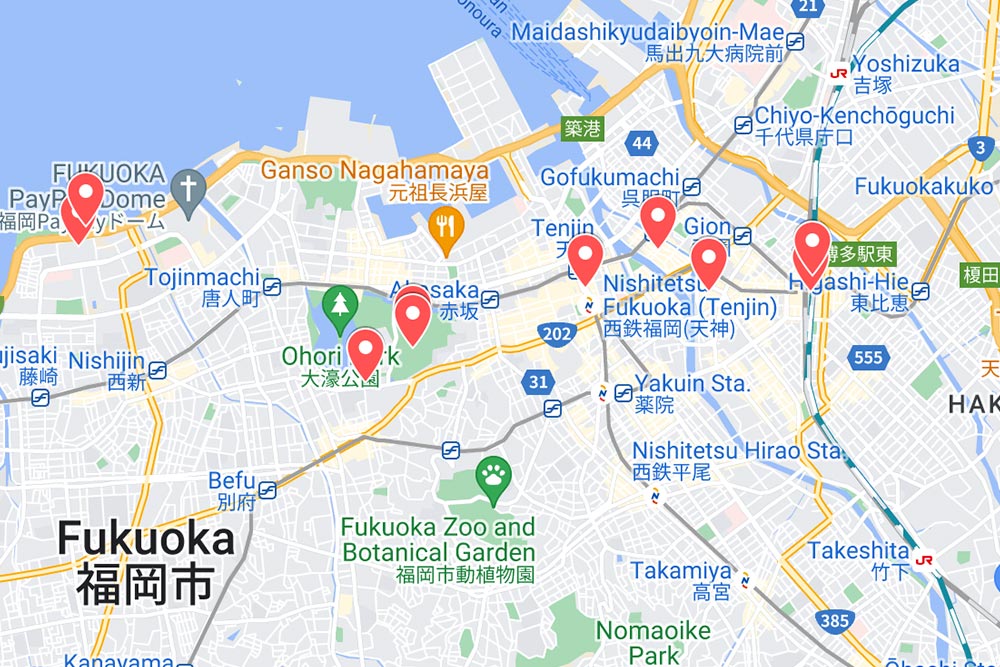
Fukuoka, a vibrant city nestled on the northern coast of Kyushu Island, Japan, offers a captivating blend of modern amenities and traditional charm. For visitors and residents alike, understanding the city’s layout is crucial for maximizing its exploration and enjoyment. This guide delves into the intricacies of Fukuoka’s map, providing a comprehensive understanding of its key areas, transportation systems, and points of interest.
Fukuoka’s Geographic Landscape: A City of Contrasts
Fukuoka’s topography is characterized by a dynamic interplay of land and water. The city is strategically positioned on the shores of Hakata Bay, with the Naka River meandering through its heart. This natural setting creates a unique urban landscape, with distinct neighborhoods sprawled across flat plains and rolling hills.
Central Fukuoka: The city’s core, often referred to as "Downtown Fukuoka," is a bustling hub encompassing areas like Tenjin, Hakata, and Nakasu. This zone is a vibrant tapestry of commercial districts, shopping centers, entertainment venues, and historical landmarks.
Tenjin: Known for its upscale boutiques, department stores, and trendy restaurants, Tenjin is a shopping paradise. The area also boasts the iconic Fukuoka City Hall, a symbol of the city’s administrative center.
Hakata: A historical port town, Hakata is renowned for its bustling markets, traditional crafts, and delicious street food. The Hakata Station, a major transportation hub, serves as the gateway to Fukuoka.
Nakasu: This lively entertainment district is renowned for its vibrant nightlife, bustling bars, and traditional restaurants. The Nakasu River, flowing through the heart of the area, adds to its charm.
Beyond the Core: Venturing beyond the city center reveals a diverse range of neighborhoods, each with its own unique character.
Fukuoka City: This expansive area encompasses various residential districts, parks, and cultural institutions. The Fukuoka Tower, a prominent landmark, offers panoramic views of the city and surrounding areas.
Higashi Ward: Located east of the city center, this ward is known for its historical sites, traditional temples, and peaceful parks. The Fukuoka Art Museum, a prominent cultural institution, is located in this area.
Minami Ward: Situated south of the city center, this ward boasts a blend of residential areas, commercial districts, and recreational facilities. The Fukuoka Zoo and Botanical Garden, a popular attraction, is located in this area.
West Ward: This ward encompasses the city’s waterfront area, offering scenic views of Hakata Bay. The Fukuoka Marine World, an aquarium showcasing diverse marine life, is located in this area.
Navigating Fukuoka: Transportation Options
Fukuoka offers a comprehensive and efficient transportation network, making it easy to explore the city.
Subway: The Fukuoka City Subway system consists of three lines: the Kuko Line, the Nanakuma Line, and the Hakata Line. This network provides convenient and fast access to major destinations throughout the city.
Bus: An extensive bus network serves various areas within the city and connects Fukuoka to surrounding towns and cities. Bus stops are conveniently located throughout the city, offering a flexible mode of transportation.
Train: The JR Kyushu Railway network connects Fukuoka to other major cities in Japan. The Hakata Station serves as a major hub for high-speed Shinkansen trains, providing swift access to destinations like Tokyo, Osaka, and Hiroshima.
Taxi: Taxis are readily available in Fukuoka, offering a comfortable and convenient mode of transportation, especially for shorter distances.
Cycling: With its flat terrain and dedicated bike lanes, Fukuoka is an ideal city for exploring on two wheels. Bicycle rental services are widely available, allowing visitors to experience the city at their own pace.
Walking: For those seeking a leisurely exploration, walking is a great way to discover hidden gems and experience the local atmosphere. Fukuoka’s central areas are pedestrian-friendly, with well-maintained sidewalks and public squares.
Unveiling Fukuoka’s Treasures: Points of Interest
Fukuoka offers a rich tapestry of cultural attractions, historical landmarks, and natural wonders, ensuring a fulfilling experience for every visitor.
Historical Landmarks:
-
Hakata Station: This grand railway station, a symbol of Fukuoka’s modern infrastructure, boasts a distinctive architectural design and serves as a gateway to the city.
-
Fukuoka Castle: This historical site, built in the 16th century, offers a glimpse into Fukuoka’s rich past. The castle grounds, now a park, provide a serene escape from the city’s hustle and bustle.
-
Sumiyoshi Shrine: This ancient Shinto shrine, dating back to the 3rd century, is a testament to Fukuoka’s rich religious heritage. The shrine’s tranquil atmosphere and traditional architecture offer a spiritual retreat.
-
Kanzeonji Temple: This Buddhist temple, known for its intricate architecture and serene gardens, is a popular destination for both locals and visitors. The temple’s peaceful atmosphere and stunning views provide a sense of tranquility.
Cultural Attractions:
-
Fukuoka Art Museum: This renowned institution showcases a diverse collection of Japanese and international art, providing a glimpse into the world of contemporary and traditional artistic expression.
-
Fukuoka City Museum: This museum houses a collection of artifacts and exhibits that tell the story of Fukuoka’s history, culture, and development.
-
Fukuoka Asian Art Museum: This museum focuses on Asian art, showcasing a diverse collection of works from various regions, providing insights into the artistic traditions of the continent.
-
Fukuoka City Hall: This modern architectural masterpiece serves as the administrative center of Fukuoka. The building’s observation deck offers panoramic views of the city.
Natural Wonders:
-
Uminonakamichi Seaside Park: This expansive park, located on the coast, offers stunning views of Hakata Bay. The park’s diverse landscape includes beaches, forests, and gardens, providing a tranquil escape from the city.
-
Naka River: This meandering river flows through the heart of Fukuoka, creating a picturesque waterway. The riverbanks are lined with parks, cafes, and restaurants, offering a scenic setting for relaxation.
-
Fukuoka Zoo and Botanical Garden: This popular attraction houses a diverse collection of animals and plants, providing a fun and educational experience for visitors of all ages.
-
Fukuoka Marine World: This aquarium showcases a diverse array of marine life, from playful dolphins to graceful sea turtles. Visitors can learn about marine ecosystems and the importance of conservation.
FAQs About Fukuoka’s Map
Q: What is the best way to get around Fukuoka?
A: Fukuoka offers a comprehensive transportation network, including the subway, bus, train, taxi, and bicycle rental services. The best option depends on your individual needs and preferences. For exploring the city center, the subway is efficient and convenient. For longer distances or reaching specific destinations, buses and trains are ideal. Taxis offer a comfortable option for shorter distances.
Q: Where are the best places to shop in Fukuoka?
A: Tenjin is known for its upscale boutiques, department stores, and trendy restaurants. Hakata is renowned for its traditional crafts, street food, and bustling markets. For a diverse shopping experience, explore both areas.
Q: What are the must-see attractions in Fukuoka?
A: Fukuoka offers a wealth of attractions, including historical landmarks like Hakata Station and Fukuoka Castle, cultural institutions like the Fukuoka Art Museum, and natural wonders like Uminonakamichi Seaside Park and Naka River.
Q: What are the best places to eat in Fukuoka?
A: Fukuoka is a culinary paradise, offering a wide variety of cuisines. Hakata is known for its ramen, while Tenjin boasts a diverse range of restaurants, from traditional Japanese to international cuisine.
Q: What are the best places to stay in Fukuoka?
A: Fukuoka offers a range of accommodations, from budget-friendly hostels to luxurious hotels. The best option depends on your travel style and budget.
Q: Is Fukuoka a safe city to visit?
A: Fukuoka is generally considered a safe city for visitors. However, it is always important to exercise common sense and take precautions, as in any major city.
Tips for Exploring Fukuoka
-
Purchase a Fukuoka City Subway Pass: This pass offers unlimited travel on the subway system, making it an economical option for exploring the city.
-
Learn basic Japanese phrases: While many people in Fukuoka speak English, learning a few basic phrases can enhance your experience and facilitate communication.
-
Try local delicacies: Fukuoka is known for its delicious cuisine, including Hakata ramen, motsunabe, and mentaiko.
-
Explore the city’s parks and gardens: Fukuoka boasts a wealth of green spaces, offering a tranquil escape from the city’s hustle and bustle.
-
Take a day trip to nearby attractions: Fukuoka is conveniently located near other attractions, such as the island of Iki and the city of Nagasaki.
Conclusion
Fukuoka’s map is a gateway to a city brimming with vibrant energy, rich history, and cultural diversity. Understanding the city’s layout, transportation systems, and points of interest is key to unlocking its treasures and creating a truly enriching experience. Whether you are a seasoned traveler or a first-time visitor, Fukuoka’s map serves as a guide to navigating its captivating streets, discovering its hidden gems, and immersing yourself in its unique charm.

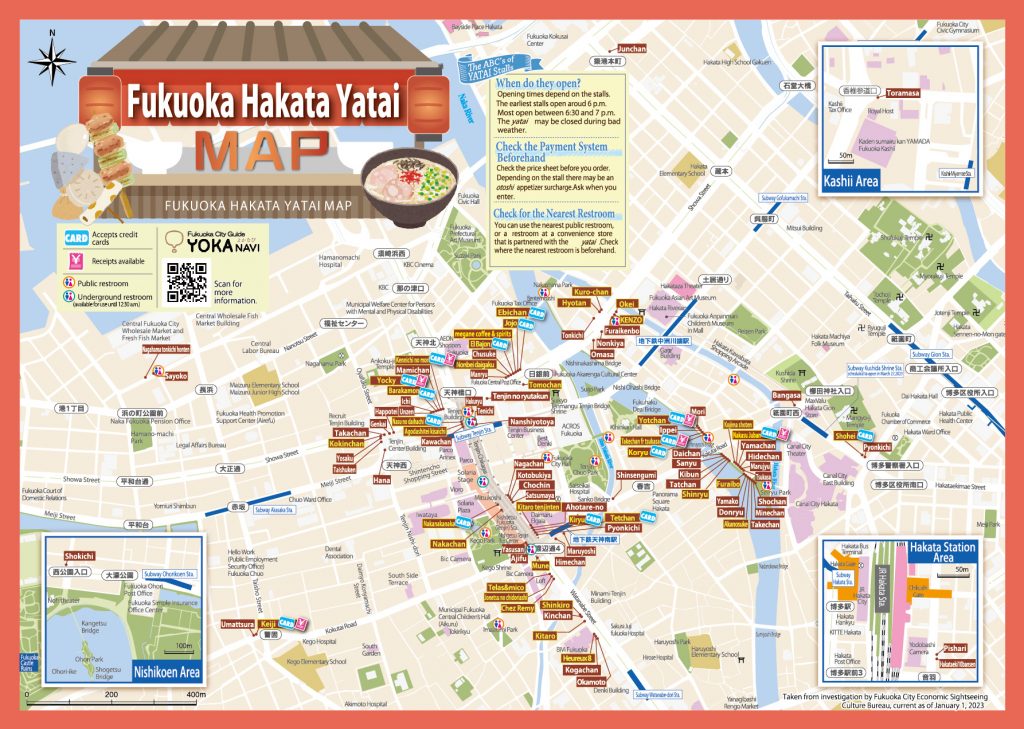
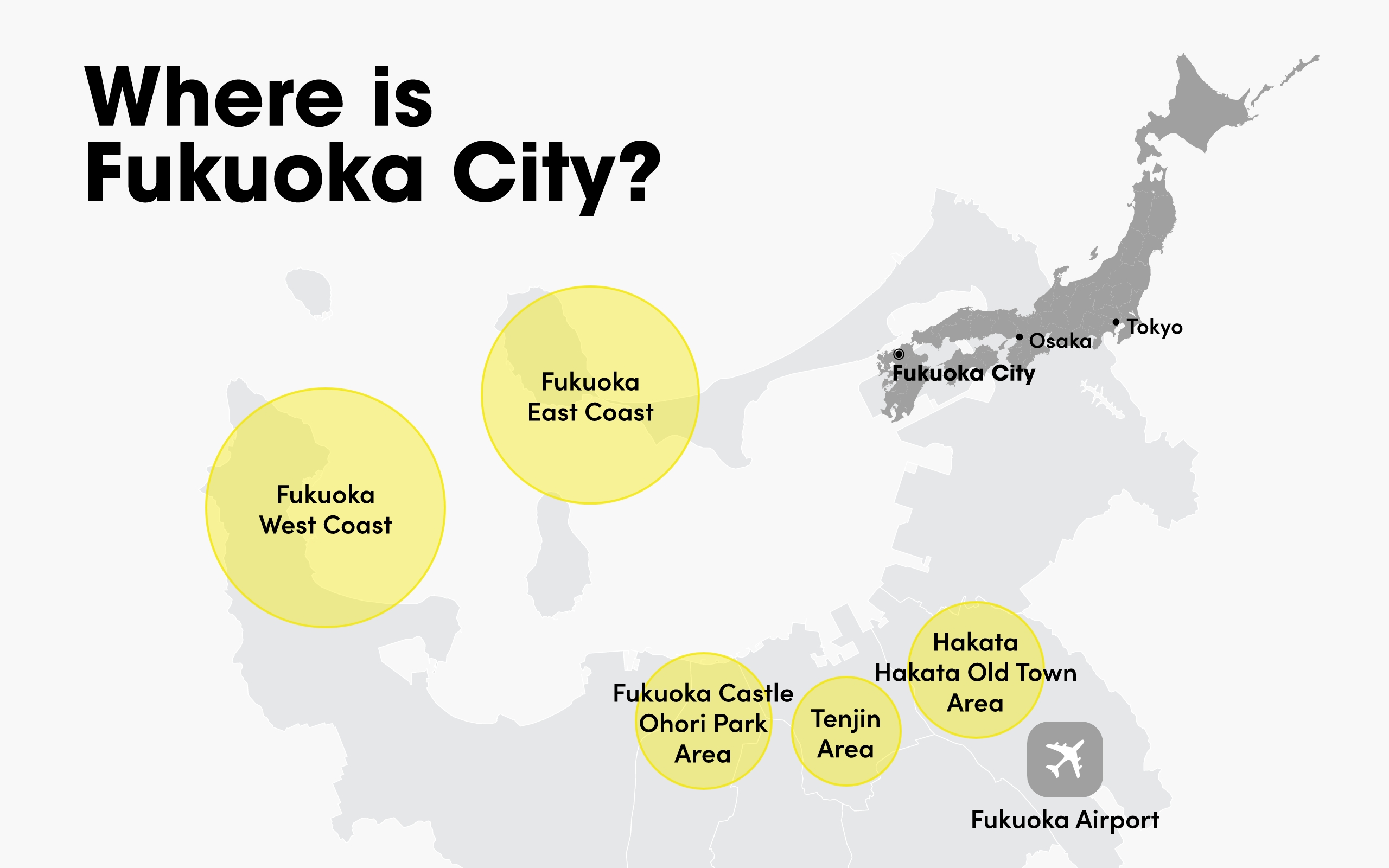
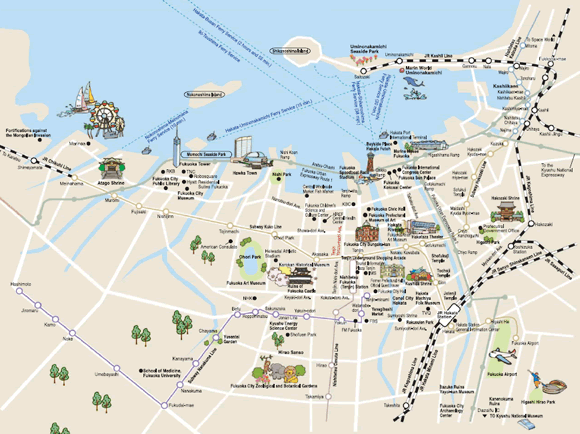
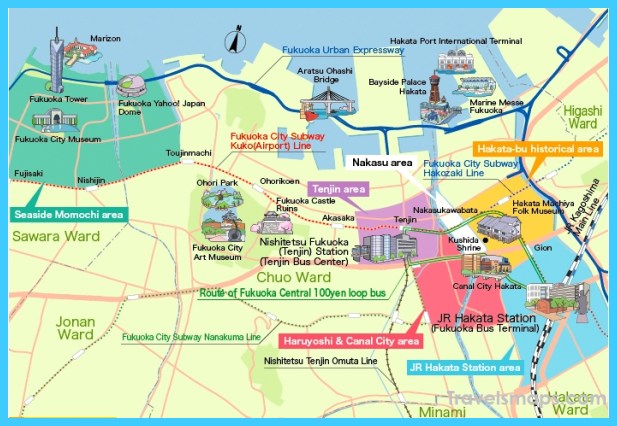


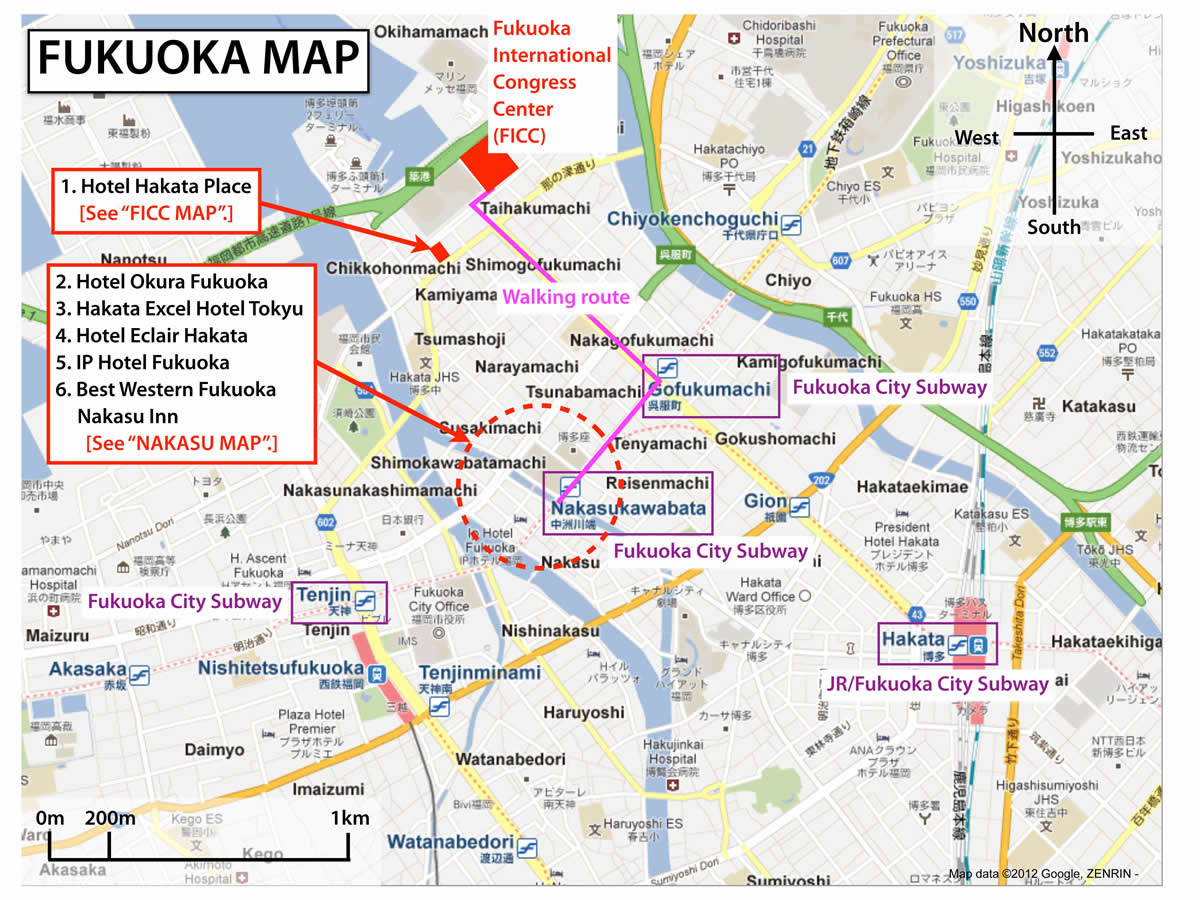
Closure
Thus, we hope this article has provided valuable insights into Navigating Fukuoka: A Comprehensive Guide to the City’s Map. We appreciate your attention to our article. See you in our next article!